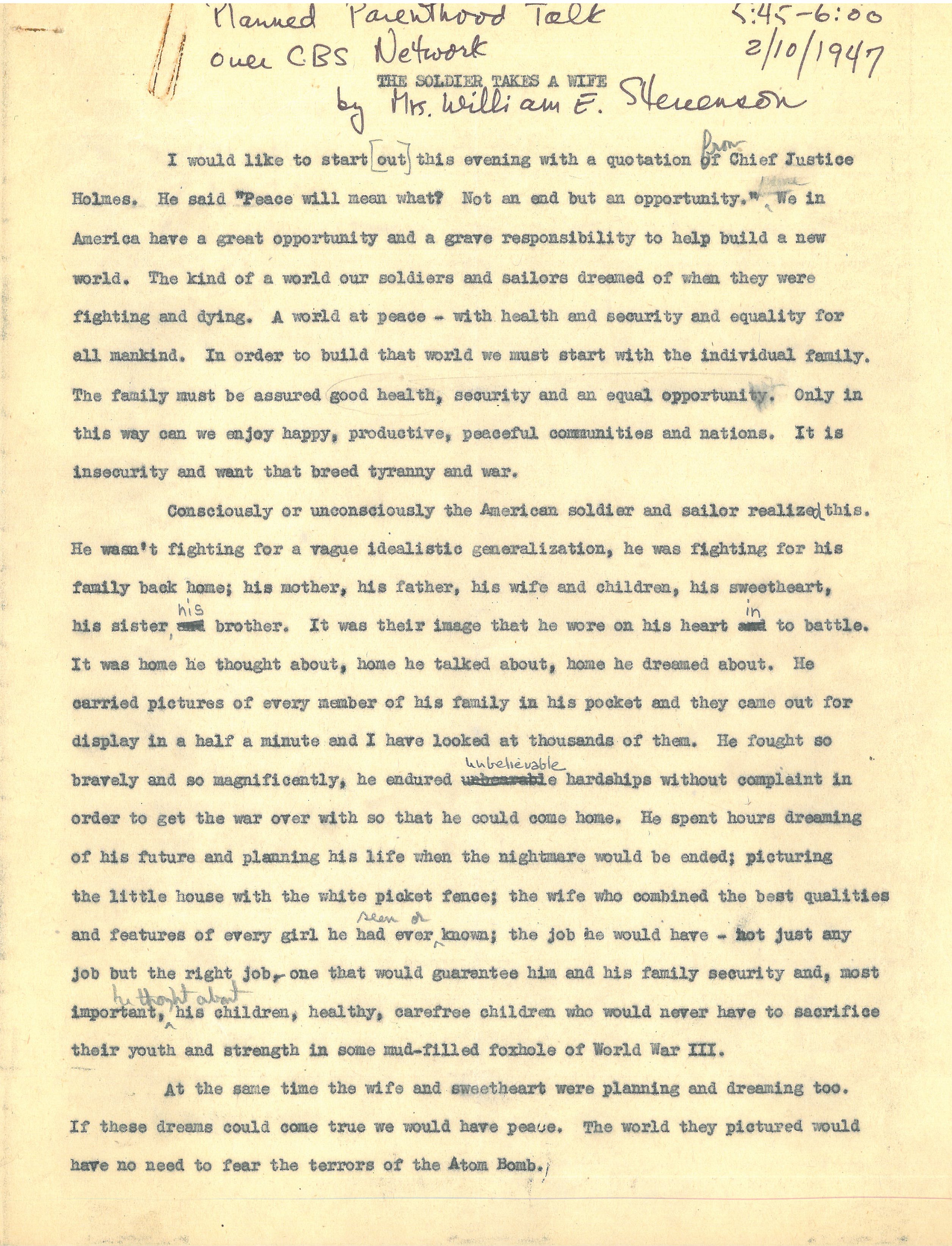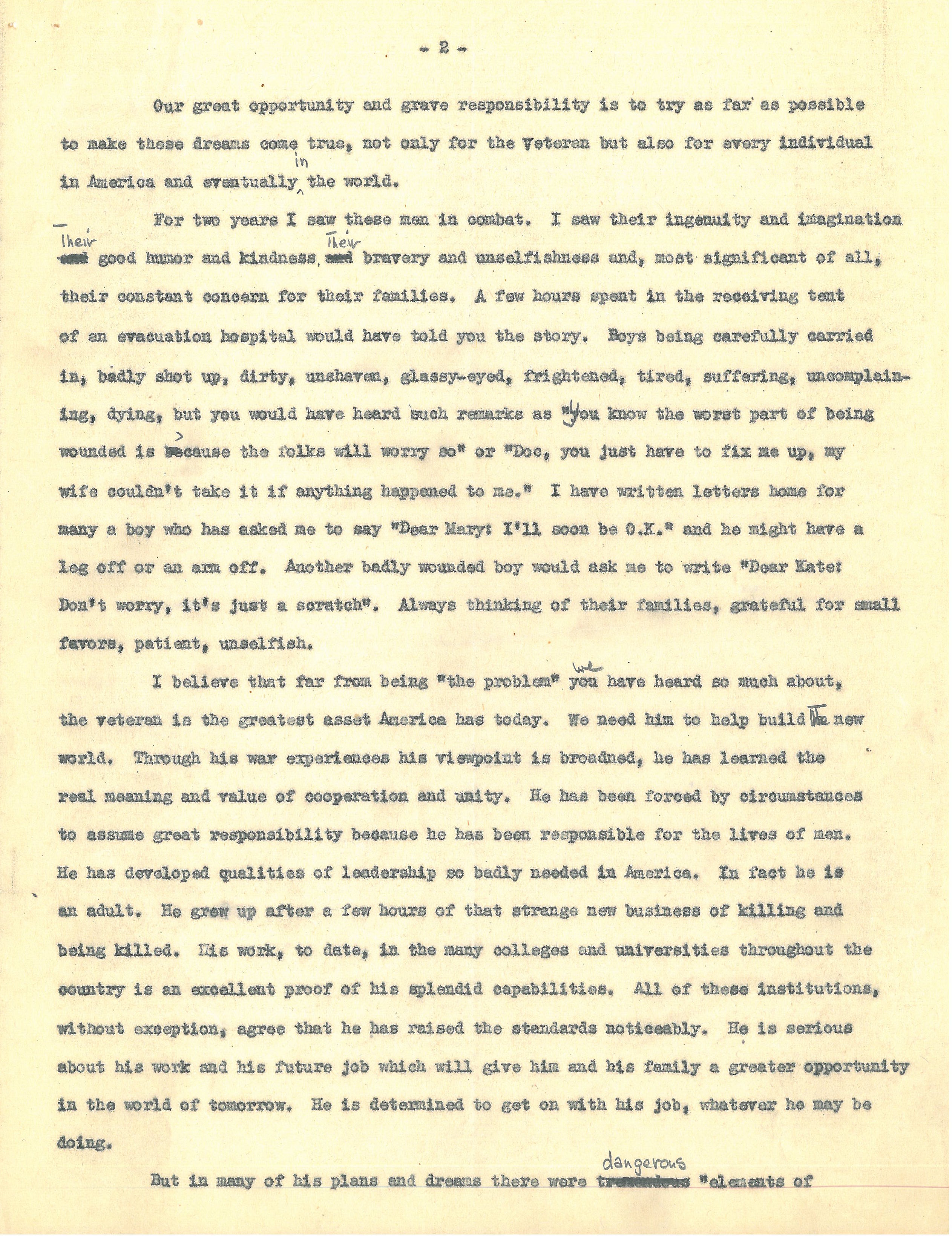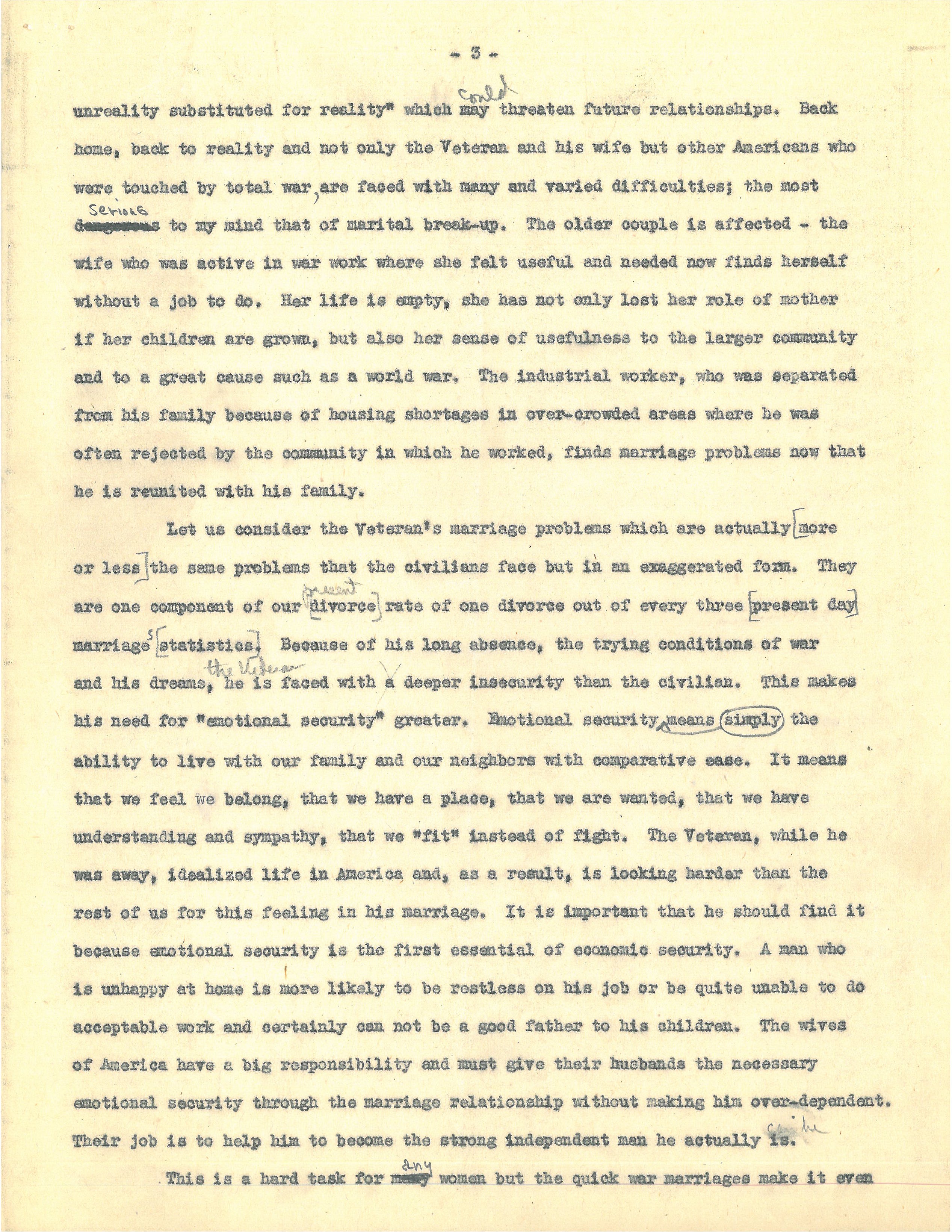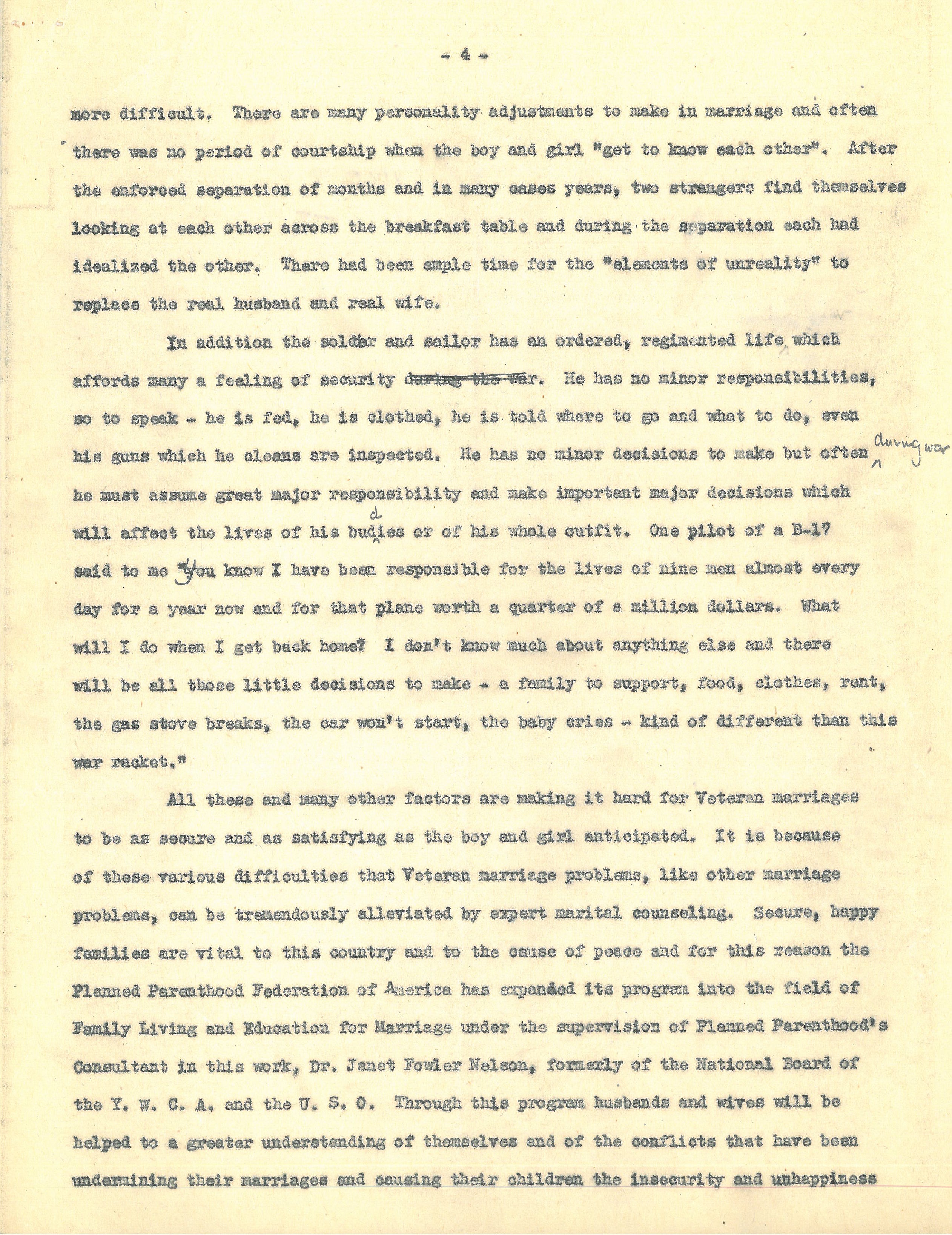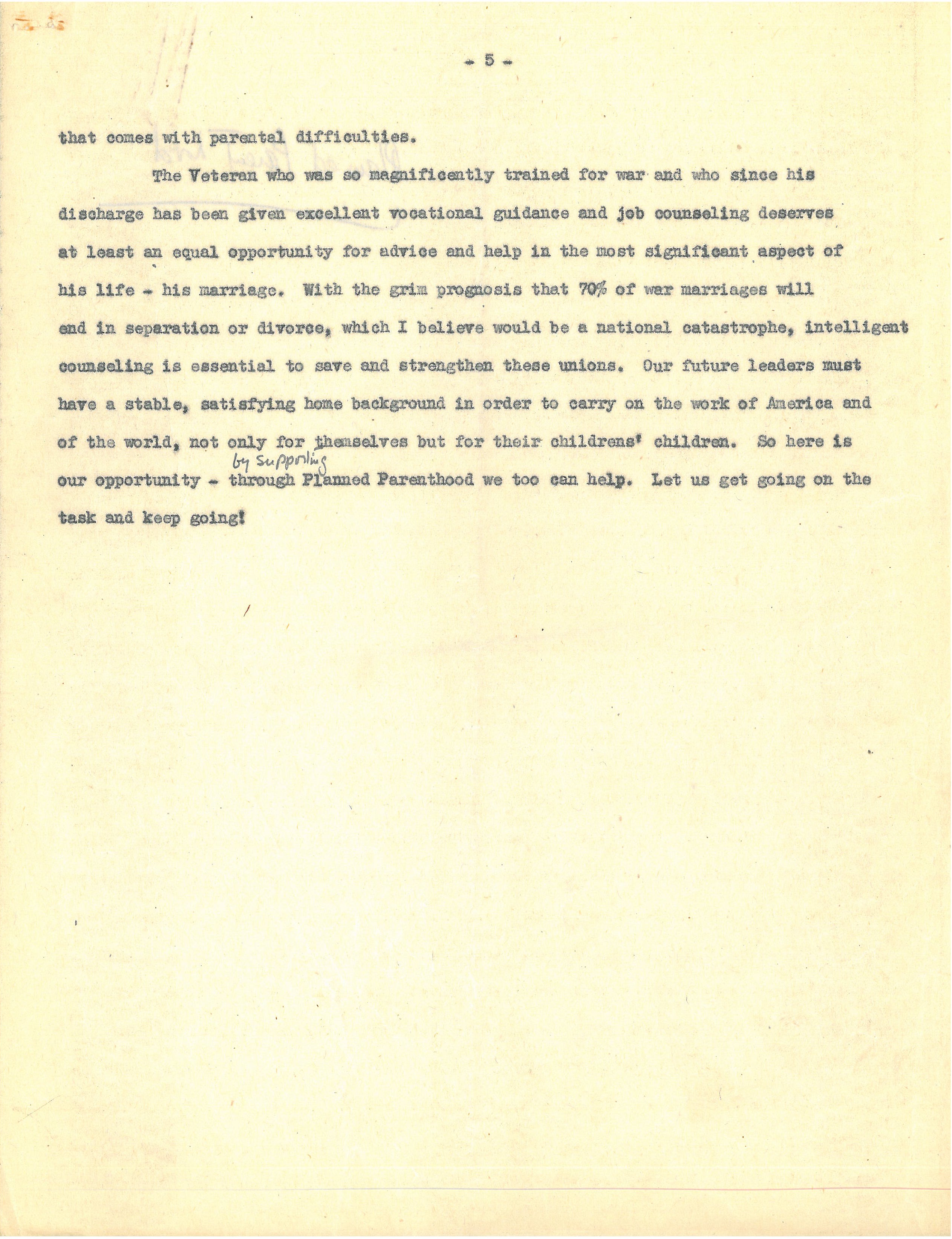|
|
Transcription:
<Planned Parenthood Talk 5:45 – 6:00 over CBS Network[2] 2/10/1947> THE SOLDIER TAKES A WIFE <by Mrs. William E. Stevenson>
I would like to start <(>out <)> this evening with a quotation of <from> Chief Justice Holmes.[3] He said “Peace will mean what? Not an end but an opportunity.”[4] We in America have a great opportunity and a grave responsibility to help build a new world. The kind of a world our soldiers and sailors dreamed of when they were fighting and dying. A world at peace – with health and security and equality for all mankind. In order to build that world we must start with the individual family. The family must be assured good health, security and an equal opportunity. Only in this way can we enjoy happy, productive, peaceful communities and nations. It is insecurity and want that breed tyranny and war. Consciously or unconsciously the American soldier and sailor realize<d> this. He wasn’t fighting for a vague idealistic generalization, he was fighting for his family back home; his mother, his father, his wife and children, his sweetheart, his sister, and <his> brother. It was their image that he wore on his heart and <in> to [sic] battle. It was home he thought about, home he talked about, home he dreamed about. He carried pictures of every member of his family in his pocket and they came out for display in a half a minute and I have looked at thousands of them. He fought so bravely and so magnificently, he endured unbearable <unbelievable> hardships without complaint in order to get the war over with so that he could come home. He spent hours dreaming of his future and planning his life when the nightmare would be ended; picturing the little house with the white picket fence; the wife who combined the best qualities and features of every girl he had ever <seen or> known; the job he would have – not just any job but the right job, one that would guarantee him and his family security and, most important, <he thought about> his children, healthy, carefree children who would never have to sacrifice their youth and strength in some mud-filled foxhole[5] of World War III. At the same time the wife and sweetheart were planning and dreaming too. If these dreams could come true we would have peace. The world they pictured would have no need to fear the terrors of the Atom Bomb. Our great opportunity and grave responsibility is to try as far as possible to make these dreams come true, not only for the Veteran but also for every individual in America and eventually <in> the world. For two years I saw these men in combat. I saw their ingenuity and imagination and <their> good humor and kindness and <their> bravery and unselfishness and, most significant of all, their constant concern for their families. A few hours spent in the receiving tent of an evacuation hospital would have told you the story. Boys being carefully carried in, badly shot up, dirty, unshaven, glassy-eyed, frightened, tired, suffering, uncomplaining, dying, but you would have heard such remarks as “<Y>ou know the worst part of being wounded is be<’>cause the folks will worry so” or “Doc, you just have to fix me up, my wife couldn’t take it if anything happened to me.” I have written letters home for many a boy who has asked me to say “Dear Mary: I’ll soon be O.K.” and he might have a leg off or an arm off. Another badly wounded boy would ask me to write “Dear Kate: Don’t worry, it’s just a scratch”. [sic] Always thinking of their families, grateful for small favors, patient, unselfish. I believe that far from being “the problem” you <we> have heard so much about, the veteran is the greatest asset America has today. We need him to help build a <the> new world. Through his war experiences his viewpoint is broadned [sic], he has learned the real meaning and value of cooperation and unity. He has been forced by the circumstances to assume great responsibility because he has been responsible for the lives of men. He has developed qualities of leadership so badly needed in America. In fact he is an adult. He grew up after a few hours of that strange new business of killing and being killed. His work, to date, in the many colleges and universities throughout the country is an excellent proof of his splendid capabilities. All of these institutions, without exception, agree that he has raised the standards noticeably. He is serious about his work and his future job which will give him and his family a greater opportunity in the world of tomorrow. He is determined to get on with his job, whatever he may be doing. But in many of his plans and dreams there were tremendous <dangerous> “elements of unreality substituted for reality”[6] which may <could> threaten future relationships. Back home, back to reality and not only the Veteran and his wife but other Americans who were touched by total war<,> are faced with many and varied difficulties; the most dangerous <serious> to my mind that of marital break-up. The older couple is affected – the wife who was active in war work where she felt useful and needed now finds herself without a job to do. Her life is empty, she has not only lost her role of mother if her children are grown, but also her sense of usefulness to the larger community and to a great cause such as a world war. The industrial worker, who was separated from his family because of housing shortages in over-crowded areas where he was often rejected by the community in which he worked, finds marriage problems now that he is reunited with his family. Let us consider the Veteran’s marriage problems which are actually <(>more or less<)> the same problems that the civilians face but in an exaggerated form. They are one component of our <present> <(>divorce<)> rate of one divorce out of every three <(>present day<)> marriage<s> <(>statistics<)>.[7] Because of his long absence, the trying conditions of war and his dreams, <the Veteran> he is faced with a deeper insecurity than the civilian. This makes his need for “emotional security” greater. Emotional security means [circled, with arrow drawn moving this before “means”: simply] the ability to live with our family and our neighbors with comparative ease. It means that we feel we belong, that we have a place, that we are wanted, that we have understanding and sympathy, that we “fit” instead of fight. The Veteran, while he was away, idealized life in America and, as a result, is looking harder than the rest of us for this feeling in his marriage. It is important that he should find it because emotional security is the first essential of economic security. A man who is unhappy at home is more likely to be restless on his job or be quite unable to do acceptable work and certainly can not be a good father to his children. The wives of America have a big responsibility and must give their husbands the necessary emotional security through the marriage relationship without making him over-dependent. Their job is to help him to become the strong independent man he actually is <can be>. This is a hard task for many <any> women but the quick war marriages make it even more difficult. There are many personality adjustments to make in marriage and often there was no period of courtship when the boy and girl “get to know each other”. [sic] After the enforced separation of months and in many cases years, two strangers find themselves looking at each other across the breakfast table and during the separation each had idealized the other. There had been ample time for the “elements of unreality” to replace the real husband and real wife. In addition the soldier and sailor has an ordered, regimented life which affords many a feeling of security during the war. He has no minor responsibilities, so to speak – he is fed, he is clothed, he is told where to go and what to do, even his guns which he cleans are inspected. He has no minor decisions to make but often <during war> he must assume great major responsibility and make important major decisions which will affect the lives of his bud< d>ies or of his whole outfit. One pilot of a B-17[8] said to me “<Y>ou know I have been responsible for the lives of nine men almost every day for a year now and for that plane worth a quarter of a million dollars. What will I do when I get back home? I don’t know much about anything else and there will be all those little decisions to make – a family to support, food, clothes, rent, the gas stove breaks, the car won’t start, the baby cries – kind of different than this war racket.” All these and many other factors are making it hard for Veteran marriages to be as secure and as satisfying as the boy and girl anticipated. It is because of these various difficulties that Veteran marriage problems, like other marriage problems, can be tremendously alleviated by expert marital counseling. Secure, happy families are vital to this country and to the cause of peace and for this reason the Planned Parenthood Federation of America[9] has expanded its program into the field of Family Living and Education for Marriage under the supervision of Planned Parenthood’s Consultant in this work, Dr. Janet Fowler Nelson,[10] formerly of the National Board of the Y. W. C. A.[11] and the U. S. O.[12] Through this program husbands and wives will be helped to a greater understanding of themselves and of the conflicts that have been undermining their marriages and causing their children the insecurity and unhappiness that comes with parental difficulties. The Veteran who was so magnificently trained for war and who since his discharge has been given excellent vocational guidance and a job counseling deserves at least an equal opportunity for advice and help in the most significant aspect of his life – his marriage. With the grim prognosis that 70% of war marriages will end in separation or divorce, which I believe would be a national catastrophe, intelligent counseling is essential to save and strengthen these unions. Our future leaders must have a stable, satisfying home background in order to carry on the work of America and of the world, not only for themselves but for their childrens’ [sic] children. So here is our opportunity – through <by supporting> Planned Parenthood we too can help. Let us get going on the task and keep going!
[Transcribed by Rachel Mead.] |
[1] Though often thought of solely as a provider of contraception, Planned Parenthood offered (and continued to offer) wide range of health and family related resources, including marriage counselling.
[2] “CBS was established in 1928, when founder William Paley purchased 16 independent radio stations and christened them the Columbia Broadcast System.” (“CBS Television Network | CBS Corporation.” Accessed 5 July 2016. Web link).
[3] Oliver Wendell Holmes, Jr. was a justice of the Supreme Court of the United States appointed by Theodore Roosevelt in 1902 and remained on the court for thirty years. He was briefly Acting Chief Justice, in February of 1930, after the declining health of Chief Justice (and former president) William Howard Taft compelled the latter to retire from the court (Roger K. Newman, ed., The Yale Biographical Dictionary of American Law, (New Haven, CT: Yale University Press, 2009) 272).
[4]The source and context of this quote is unclear, though Holmes expressed somewhat similar sentiments in two memorial day speeches he gave (“The Soldier’s Faith.” Accessed 5 July 2016. Source).
[5] A foxhole was a type of military fortification in WWII that is generally defined as “A small pit providing protection from enemy fire, usually for one or two persons, while allowing effective fire from within.” Foxholes were often miserable places to be, full of mud and standing water (“Foxhole | Academic Press Dictionary Of Science An… – Credo Reference.” Accessed 7 July 2016. Source).
[6] It is unclear what this quote is from.
[7] This statistic of one in three marriages ending in divorce was reported by Newsweek after the end of the war, and were the subject of much handwringing, as it was double pre-war totals. However, it is worth noting that the divorce numbers were lower than predicted, that majority of divorces did not involve G.I.s, and that only 8% of divorces occurred among couples with children (Doris Weatherford, American Women and World War II. History of Women in America. (New York: Facts on File, 1990), 260).
[8] The B-17, known as the “Flying Fortress”, was a Boeing plane first built in 1935. The B-17 first saw action in 1941 when the British Royal Air Force used several of them on high altitude missions, which the B-17 were uniquely suited for. These planes were also incredibly sturdy, and could remain aloft even after suffering brutal attacks. The American Air Commander in Europe stated that “Without the B-17 we may have lost the war.” Most were scrapped at the end of World War II (“Historical Snapshot: B-17 Flying Fortress.” Boeing. Accessed 5 July 2016. Source).
[9] The Planned Parenthood Federation of America was founded in 1942, the descendant of several groups founded in the previous two decades that supported young women and couples in need of family planning advice and health care (“Planned Parenthood Federation of America | American Family Planning, Social Service Organization | Britannica.com.” Accessed 8 July, 2016. Source).
[10] Dr. Nelson (b. 1901) was a well-known marriage counselor, who worked on the Committee on Family Relationships for the YWCA, and published such books as Marriages are Not Made in Heaven and Marriage Counseling: A Casebook (Janet Fowler Nelson and Margaret Hiller, Marriages are Not Made in Heaven, (New York: Women’s Press, 1939)).
[11] The Young Women’s Christian Association. This association was begun in New York in 1858, and was initially called the Ladies Christian Association (the term YWCA was first used in 1866). It was aimed at providing aid to women in need and has more recently been associated with anti-racist and labor movements as well.(“History – YWCA USA.” YWCA USA. web address, accessed 6 July 2016).
[12] United Service Organizations. In 1941, President Roosevelt united several service organizations, including the Y.W.C.A., into the USO, a nonprofit, charitable corporation, which was designed to “lift the morale of our military and nourish support on the home front.” The USO provides a wide variety services to members of the U.S. Military and their families, including educational programs, entertainment for troops overseas, and resources and counselling for families (“The Organization.” USO.org. Accessed 5 July 2016. Source).
